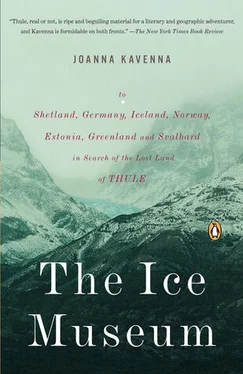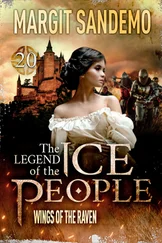There was a pause. He stared at the floor again.
‘So you feel everything has changed?’ I asked.
‘Yes,’ he said, firmly. ‘And when we ask will things ever be like that again in the future, so far as I can see it will be very different—and it will take a long time, a very long time, before our nature gets back to this wildness, but it was marvellous and it was one of the pillars of the Norwegian sense of nature—these things that we were experiencing, in the water. Because it seems that we have a special relationship to nature in Norway—even in Sweden, it’s not even the same in Sweden—there is something, something there. And so many Norwegians when they are . . . what is the word . . . wanting to commit suicide—I call it voluntary limitation of life—then they go into nature, and they die. Strange, isn’t it?’
Arne was in mourning for the lost past, the pure past of his country, when the landscape was pristine, he said. In the century Arne had lived through, the remote north had become accessible by plane, by icebreaker. But Arne thought something had happened to the lands closer to home, even to the fjords of Norway, to the empty places of Europe. Even here the century had shifted the scenery, he was saying. There was a pause, and then he said: ‘For many many hundreds of years in Norway you didn’t have neighbours, there were no neighbours, because there were quite big distances between people—so they had either to find themselves lonely or to relate more personally to the nature around them. Otherwise they would be very lonely, thinking, “Oh my God we are so lonely.” ’ And he laughed quietly.
‘But, they didn’t feel lonely, because they had this personal intimate relation to nature. Now people have for the last fifty years or more, more and more gone into cities, and there are very few, mostly old people, who are living out in the rural areas, mostly old people. I am sorry for that, of course,’ and he shook his head. ‘Really, ’ he said, ‘it is OK that they get neighbours, but they should continue to have this very personal relationship to nature.’ He nodded slowly. He seemed to be thinking.
By Arne’s standards, Nansen lived in benighted immaturity, seeking to claw a path across the indifferent wilderness, to perch his flag on a piece of ice. But Nansen also lived in the golden age that Arne was mourning, ‘when we had so much light, you could see the stars, and children were there under the heaven of stars. You didn’t get smaller, by that, you got greater by that, by being together with the stars—you were greater by being together with the stars.’
‘So have people lost this experience?’ I was asking.
Arne never answered a question directly. It made him slightly gnomic, with his head cocked to one side and a slight smile curling his lips.
‘I want to tell you about mountains,’ he said. ‘I have seen a lot of mountains. In the mountains you have a basic sense of upward, ascent. And this is positive,’ he was adding. ‘ “Ascent” is a positive word. Up and up. A great increase. And so on. So you have feelings there which are satisfied without you knowing it. You see, there is the sky. The bigness of mountains, that’s one thing, and then you have the greatness. There are some mountains in western Norway which are just as great as Mount Everest. But they are not so big, but that is not the essence of mountains, it’s not the bigness, it’s the up, the getting higher, and the broadening of the outlook, seeing vast areas.’
When this wizened philosopher could still climb, he refused to reach the tops of mountains, renouncing the quest for domination over the natural world, he claimed. A sense of the smallness of the self, the vastness of nature, he seemed to be saying, was somehow revitalizing, a healthy experience to have from time to time. Arne thought that the only goal of his submission was to find unity with nature, and he started to tell a story about when he climbed a series of peaks, across the Mediterranean.
‘I started getting to the summit of each mountain, but after about thirty summits, I could go just because of the beauty and the greatness. And even though the summit was only ten metres from me, I would not take those ten metres, to include that summit also in my list of summits. I would just go where it was great to go. I was getting more mature. Going for days and days and days, I got more mature. What is really here? What’s the greatness, what’s the greatness? What’s the greatness in my experience of these mountains? And then of course the summits were not counted any longer, at all.’
Arne was winding up, his words no longer falling into sentences, instead he was sounding a little like a hippie Beckett—‘When you have something like this, you know this is—I will be in this, yes I am at this moment, no more, you are—what I do now—breathing deeply, breathing deeply, and feel this different relation to time; something gets away from you—time-bound no longer—it’s just timelessness. You get a little feeling of timelessness. Slower, slower, take time, take time.’ Like Krapp’s last tape, he was concluding, a tone of determined finality to his voice.
‘I invite people to be more aware of the sense of timelessness,’ he said. Then he stopped talking, and smiled at me.
It seemed to be a hint that I should disappear, and I stood up. ‘And now we must hug,’ he said. ‘For three seconds only. To fully engage with each other.’
He put his arms around me, and counted to three loudly. Then I was moved quickly onto the steps of the house. He smiled, and waved, his wave like a child’s, emphatic and staged. Then he shut the door.
There will come a time, Nansen had thought, when the goal that was the Arctic wilderness will have been explored, and there will be nothing left to find. But our longing for a simple life will be unsatisfied; we will continue to search for silent places. Even as everyone set off on their wilderness holidays, Arne and the prophets were telling them it was doomed. Wherever they went, they would find traces of humanity and signs of future destruction. It made for a forbidding doctrine. It was nostalgic; it preferred things as they were a hundred years ago. Nansen had seen the beginning of the descent, Arne was saying; nature was now measurable, the furthest north was barren and hostile but somehow less mysterious. But there was a guarded optimism to Arne’s talk. He refused to believe it was over; he shied away from sounding the final mournful chord. Even as he talked of a wake for the wilderness, Arne was preaching the consolations of emptiness. He couldn’t let go of the dream of Thule, even as he said the northern wilderness was endangered.
I walked along the snow-mountain, with the lights of the city like distant fires lining the fjord. The trees were hissing and the wind felt harsher than before. The sun was sinking towards the horizon. The snow coated my feet, and the darkness in the forest made me hurry towards the incandescent platform. I stumbled under the bridge, running to beat the sunset, as the air grew colder.
Because I grew up in the countryside, in a verdant part of Britain, my early memories were entwined with the seasonal change of the fields, the fires which purged them after the harvest, the smoke lingering along the streets, the sound of tractors sowing new seeds, the corn turning golden and then being harvested. Before I understood anything about time, I was aware that things recurred, that there was a pace to nature, a particular sort of process, immutable, reassuring in its regularity. I knew that as leaves fell from the trees combine harvesters would churn through the fields; I knew that an acrid taste in the morning meant that winter was coming. The cornfields were at the end of my street; it was a walk of a few minutes to the first line of trees, with the fields stretching beyond, immense to a child. There was a dust track through the fields called the Donkey Track, with a stream running alongside, and I used to run along there with friends, dimly aware of the colours of the crops, the foliage of the hedgerows, the sound of the birds. We made dens in the streams, piling up hay to dam the water; rummaging around by the sides of the streams we would find field mice, quantities of baby rabbits, curled in small huddles. Because I was young, it seems when I remember that the skies were a particularly brilliant shade of blue, the summers particularly hot, the evenings particularly long, the shadows still lengthening along the garden when I was summoned to bed, my bedroom a dim orange as I put my head under the pillows to sleep.
Читать дальше












